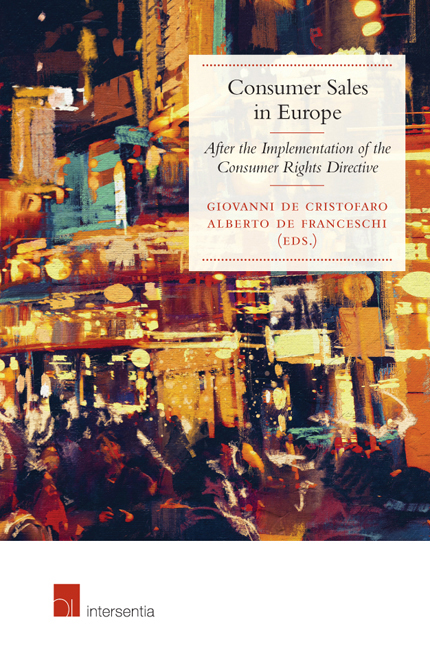United Kingdom
Published online by Cambridge University Press: 19 September 2018
Summary
INTRODUCTION: CONTEXT
The starting point for this chapter is the implementation of the Consumer Rights Directive (CRD)1 in the United Kingdom. Although the implementation itself is rather unremarkable in that it largely copies out the text of the CRD verbatim (something which undoubtedly is a side-effect of the maximum harmonisation nature of the CRD),2 the prospect of a much more detailed Directive with a wider scope – as originally proposed – prompted the UK government to embark upon a wider process of reforming and modernising UK consumer law. This has culminated in the enactment of the Consumer Rights Act 2015, although, as will become clear, the Act does not constitute as significant a development as had originally been hoped. The discussion of the implementation of the CRD will therefore focus mainly on this wider reform process. Later sections in this chapter will consider how the EU's special rules for consumer sales fit into the landscape of general sales law, as well as what might have been the possible impact of the Common European Sales Law (CESL) – although the latter's fate makes these observations rather academic now.
TOWARDS CONSUMER LAW REFORM
It is well-known that the legal system of England and Wales is a common law system, which means that most of the law in the private law field is found in case law rather than in legislation – and there is no codification of private law as such. There are some aspects of private law which have been put on a statutory footing through legislation, but these are not wide-ranging attempts to codify large areas of private law.
The field of consumer law, on the other hand, is largely found in legislation, with more recent measures adopted in response to EU Directives (although there was a considerable body of legislation in place before the EU embarked on its harmonisation programme). However, despite this, there is no single statute which includes all the legislative provisions on consumer law – even the Consumer Protection Act 1987 only covered three broad areas at the time of its enactment (the implementation of the Product Liability Directive, rules on pricing, and rules on product safety), although two of those have been significantly affected by subsequent EU Directives.
- Type
- Chapter
- Information
- Consumer Sales in Europe , pp. 187 - 205Publisher: IntersentiaPrint publication year: 2016

